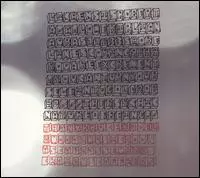The Psychic Nature of Being is no easy listen. But Robert Lowe, otherwise known as Lichens, has crafted such an immense, entrancing soundscape that anyone who does choose to listen will no doubt be entranced by the sheer beauty of it all. This is the definition of minimalism, yet there's so much to take in. His approach is unique, yet not. It's all recorded live, as is, but what's not normal is how each one of his compositions was improvised on the spot. He started to record, and whatever he played is whatever the listener is getting. No overdubs, no redos, this is as authentic as you can get.
Make no mistakes; these are not songs, they are improvisational compositions, and they will require some patience. There's three tracks here, totaling about 40 minutes, if that gives you any clue as to about how long these compositions are. They rely on nothing more than atmosphere to push them along, but Lowe does add various spots of acoustic and electric guitar, and some percussion to the thick walls of drone. Since the drone is the basis on which other elements are added, that's what you'll hear the most of. Thick and impending, but not overbearing, it controls all that comes on top of it.
The vocal loops are a strong and haunting presence, despite the fact that there's no words to them at all. "Kirlian Auras" relies heavily on those droning vocal loops to the point where adding anything else into the fray is a bit of a shock. Even the light, Middle Eastern-styled guitar picking, reserved as it may be, throws a whole new element into an otherwise empty area. It plays over the drone, and over those haunting vocal sounds, invoking a whole new side to the beauty. That acoustic guitar gently fades out in time, but the drone will still enrapture your ears and your mind long after it's faded out of consciousness. "Shoreline Scoring" sounds like just that: The vast expanses of the ocean in the form of music. The acoustic picking is back, as well as some very light percussion, but that pervasive drone still builds a wall of sound so tall, there's simply no way to overcome it. But that was never what needed to happen; the wall of sound was the basis on which other things were thrown.
The album's last track, "You Are Excrement, You Can Turn Yourself into Gold," is a journey all unto itself. Starting out with some subdued bell-like tones, there is the sounds of light screeching, until the acoustic guitar slowly plucks its way back in, with the soundscape swirling behind it, until that guitar takes on a much more prominent role in the song. Each pluck on the string feels different, and each pluck has an impact all its own, until the song seemingly dies around the ten-minute mark, but that's only halfway. Random bell sounds return, along with the dull hum of electric guitar, and the soulful playing of those new chords. Things only get louder, but still restrained as the song moves beautifully on. With such minimal instrumentation, one man is able to create such beauty and such grandeur, and it only gets better as it goes on.
Essentially beauty in nothing, these three compositions are as moving and impacting as anything a full band could recreate, and it's surely worthy of your time and attention.
